


This photo, taken in April 2012, shows three villagers from T’Nay Hsah Township with a hand tractor they brought to L--- village in order to comply with an order from Tatmadaw LIBs #358, #547, and #548 to plough a paddy field and sow paddy crops. [Photo: KHRG]
In the last four months, residents of five village tracts in T'Nay Hsah Township, Pa'an District faced demands for forced labour, including demands to plough and sow paddy crops and construct a water well, and the extortion of arbitrary fees in lieu of forced labour, for damage to crops and for participation in card games, from Tatmadaw, Border Guard and Democratic Karen Buddhist Army (DKBA) troops.
On May 23rd 2012, Tatmadaw Border Guard Battalion #1017 soldiers under the command of Battalion Commander Dih Dih[1] based at Za Ya Phyu Camp, ordered villagers from P--- village, Htee Wah Blaw village tract to hire six porters in lieu of forced labour.[2] The camp is based between R--- and K--- villages. It costs 100,000 kyat (US $122.25)[3] to hire a porter for two months of work, meaning that each household had to contribute 3,000 kyat (US $3.67) in order to raise the 600,000 kyat (US $733.50) demanded in lieu of six porters.
According to a local village head, during April 2012, Tatmadaw soldiers from Light Infantry Battalions (LIBs) #547, #548, and #549 ordered residents of Htee Hpoh Kyaw, Mya P'Deh and Noh Ta Pweh village tracts in T'Nay Hsah Township to bring 12 hand tractors from each village tract in order to plough a paddy field owned by the Tatmadaw.[4] The villagers from Htee Hpoh Kyaw village tract brought 12 hand tractors, the villagers from Mya P'Deh village tract came with nine tractors, while, the villagers from Noh Ta Pweh village tract came with only two hand tractors, making the task of ploughing the paddy field difficult.
Each village tract was ordered to plough ten acres of land, and they were required to work until they had completed the task without fail. Three villagers were required to drive and operate each hand tractor and only three bottles of petrol for each of the hand tractors were provided by the Tatmadaw soldiers per day. The Tatmadaw soldiers did not provide any food for the villagers while the work was being done, so the villagers had to bring their own food every single day until the work was completed.
After ploughing was completed, the Tatmadaw soldiers also ordered villagers to sow paddy. When the seedlings had grown and the paddy plants had become larger, the Tatmadaw herded cattle, which were grazing nearby, into the paddy field, and the cattle ate some of the paddy plants. According to a villager, this was carried out deliberately by Tatmadaw troops in order to extort money from the owners of the livestock, who were subsequently fined 30,000 kyat (US $36.67) per animal to compensate for the damaged crops.
The paddy field in which villagers were ordered to work is located near T'Nay Hsah village, beside the camp where LIB #547 and #548 are based. According to a community member, at one time Muslim villagers and Karen villagers used to live on this site, but about 20 years ago, the Burma government confiscated around 2,000 acres of land from the villagers, and this flat field comprises part of the land that was confiscated.
Older villagers explained that forced labour at this site is part of a predictable pattern of abuse, and that they have been forced to work on this paddy field every year for the past 20 years. One villager, Maung P--- from B--- village, T'Nay Hsah Township, predicted that villagers will again be ordered to harvest the paddy during the harvesting period in November 2012. He explained that villagers will again be forced to bring their own food and sickles for the purpose of harvesting the paddy crop. Maung P--- told the community member working with KHRG that he did not want his voice to be audio-recorded and did not want to be photographed.
According to that community member, villagers from Htee Hpoh Kyaw, Mya P'Deh and Noh Ta Pweh village tracts were likely to face further demands for forced labour following the completion of the ploughing and sowing of the paddy field described above. Villagers were informed that after the ploughing (pictured above) was complete, the villagers would be required to plough another paddy field, this time for the Border Guard.[5] According to that community member, villagers have been forced to plough this field every year since the formation of the DKBA[6] in 1994. The paddy field is located at the base of Noh Hta Baw cliff, close to Noh Hta Baw village. Border Guard Battalion #1015 owns the field and is based in K'Lah Koh camp, under Battalion Commander Mya Hkaing and Battalion Deputy Commander Maung Ngway Heh.
In D--- village, T'Kaw Bee village tract T'Nay Hsah Township, the DKBA donated money for the building of a well in March 2012. However, they did not construct it by themselves, but instead ordered local villagers to work on it from the beginning of the construction process until the well was completed.
Although the DKBA provided all of the materials for the construction of the well, the villagers were required to transport the materials from Kawkareik town by hand tractor, which is an hour's journey from the site of the well.
After the construction of the well was complete, the DKBA held an opening ceremony in celebration, where they gambled with villagers. By charging locals to enter card games, they were able to collect fees and replenish some of the money they had spent on providing materials to build the well.
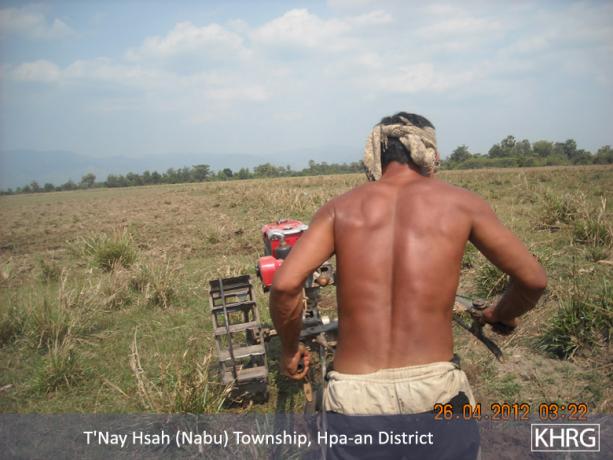 ,
, 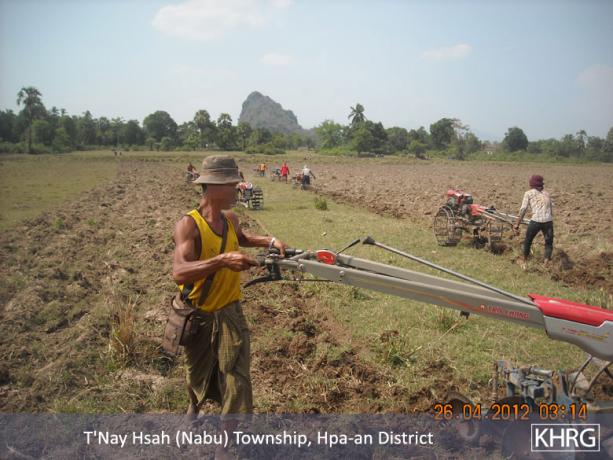 ,
,  ,
, 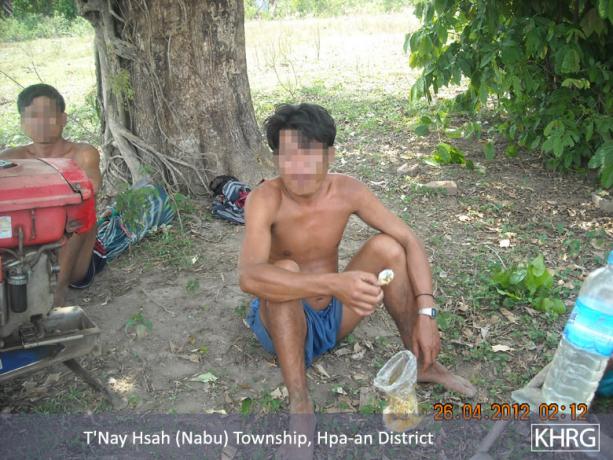
These photos, taken in April 2012, show local villagers resting while ploughing a flat field for Tatmadaw troops. The villagers were not provided with any food whilst carrying out the work, and had to bring their own supplies every day until they had completed ploughing the ten acres of land that each village tract was tasked with. [Photos: KHRG]
In the last four months, residents of five village tracts in T'Nay Hsah Township, Pa'an District faced demands for forced labour, including demands to plough and sow paddy crops and construct a water well, and the extortion of arbitrary fees in lieu of forced labour, for damage to crops and for participation in card games, from Tatmadaw, Border Guard and Democratic Karen Buddhist Army (DKBA) troops.
On May 23rd 2012, Tatmadaw Border Guard Battalion #1017 soldiers under the command of Battalion Commander Dih Dih[1] based at Za Ya Phyu Camp, ordered villagers from P--- village, Htee Wah Blaw village tract to hire six porters in lieu of forced labour.[2] The camp is based between R--- and K--- villages. It costs 100,000 kyat (US $122.25)[3] to hire a porter for two months of work, meaning that each household had to contribute 3,000 kyat (US $3.67) in order to raise the 600,000 kyat (US $733.50) demanded in lieu of six porters.
According to a local village head, during April 2012, Tatmadaw soldiers from Light Infantry Battalions (LIBs) #547, #548, and #549 ordered residents of Htee Hpoh Kyaw, Mya P'Deh and Noh Ta Pweh village tracts in T'Nay Hsah Township to bring 12 hand tractors from each village tract in order to plough a paddy field owned by the Tatmadaw.[4] The villagers from Htee Hpoh Kyaw village tract brought 12 hand tractors, the villagers from Mya P'Deh village tract came with nine tractors, while, the villagers from Noh Ta Pweh village tract came with only two hand tractors, making the task of ploughing the paddy field difficult.
Each village tract was ordered to plough ten acres of land, and they were required to work until they had completed the task without fail. Three villagers were required to drive and operate each hand tractor and only three bottles of petrol for each of the hand tractors were provided by the Tatmadaw soldiers per day. The Tatmadaw soldiers did not provide any food for the villagers while the work was being done, so the villagers had to bring their own food every single day until the work was completed.
After ploughing was completed, the Tatmadaw soldiers also ordered villagers to sow paddy. When the seedlings had grown and the paddy plants had become larger, the Tatmadaw herded cattle, which were grazing nearby, into the paddy field, and the cattle ate some of the paddy plants. According to a villager, this was carried out deliberately by Tatmadaw troops in order to extort money from the owners of the livestock, who were subsequently fined 30,000 kyat (US $36.67) per animal to compensate for the damaged crops.
The paddy field in which villagers were ordered to work is located near T'Nay Hsah village, beside the camp where LIB #547 and #548 are based. According to a community member, at one time Muslim villagers and Karen villagers used to live on this site, but about 20 years ago, the Burma government confiscated around 2,000 acres of land from the villagers, and this flat field comprises part of the land that was confiscated.
Older villagers explained that forced labour at this site is part of a predictable pattern of abuse, and that they have been forced to work on this paddy field every year for the past 20 years. One villager, Maung P--- from B--- village, T'Nay Hsah Township, predicted that villagers will again be ordered to harvest the paddy during the harvesting period in November 2012. He explained that villagers will again be forced to bring their own food and sickles for the purpose of harvesting the paddy crop. Maung P--- told the community member working with KHRG that he did not want his voice to be audio-recorded and did not want to be photographed.
According to that community member, villagers from Htee Hpoh Kyaw, Mya P'Deh and Noh Ta Pweh village tracts were likely to face further demands for forced labour following the completion of the ploughing and sowing of the paddy field described above. Villagers were informed that after the ploughing (pictured above) was complete, the villagers would be required to plough another paddy field, this time for the Border Guard.[5] According to that community member, villagers have been forced to plough this field every year since the formation of the DKBA[6] in 1994. The paddy field is located at the base of Noh Hta Baw cliff, close to Noh Hta Baw village. Border Guard Battalion #1015 owns the field and is based in K'Lah Koh camp, under Battalion Commander Mya Hkaing and Battalion Deputy Commander Maung Ngway Heh.
In D--- village, T'Kaw Bee village tract T'Nay Hsah Township, the DKBA donated money for the building of a well in March 2012. However, they did not construct it by themselves, but instead ordered local villagers to work on it from the beginning of the construction process until the well was completed.
Although the DKBA provided all of the materials for the construction of the well, the villagers were required to transport the materials from Kawkareik town by hand tractor, which is an hour's journey from the site of the well.
After the construction of the well was complete, the DKBA held an opening ceremony in celebration, where they gambled with villagers. By charging locals to enter card games, they were able to collect fees and replenish some of the money they had spent on providing materials to build the well.
 ,
, 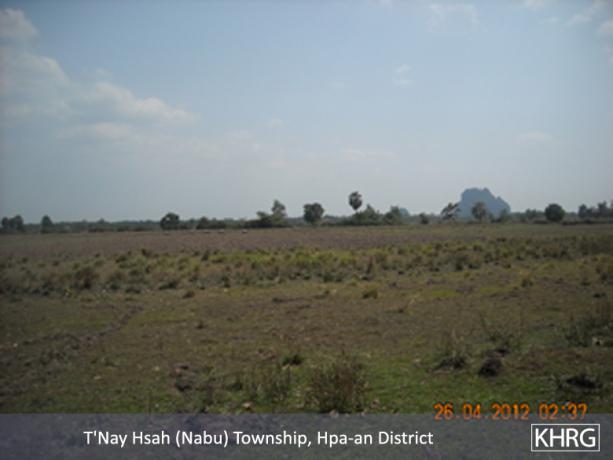
These photos, taken in April 2012, show, on the left, L--- village, and on the right, the area of land in L--- village that the villagers from T’Nay Hsah Township were forced to work on. This land was previously occupied by villagers from T’Nay Hsah Township prior to being confiscated by the Burma government approximately 20 years ago. [Photos: KHRG]
In the last four months, residents of five village tracts in T'Nay Hsah Township, Pa'an District faced demands for forced labour, including demands to plough and sow paddy crops and construct a water well, and the extortion of arbitrary fees in lieu of forced labour, for damage to crops and for participation in card games, from Tatmadaw, Border Guard and Democratic Karen Buddhist Army (DKBA) troops.
On May 23rd 2012, Tatmadaw Border Guard Battalion #1017 soldiers under the command of Battalion Commander Dih Dih[1] based at Za Ya Phyu Camp, ordered villagers from P--- village, Htee Wah Blaw village tract to hire six porters in lieu of forced labour.[2] The camp is based between R--- and K--- villages. It costs 100,000 kyat (US $122.25)[3] to hire a porter for two months of work, meaning that each household had to contribute 3,000 kyat (US $3.67) in order to raise the 600,000 kyat (US $733.50) demanded in lieu of six porters.
According to a local village head, during April 2012, Tatmadaw soldiers from Light Infantry Battalions (LIBs) #547, #548, and #549 ordered residents of Htee Hpoh Kyaw, Mya P'Deh and Noh Ta Pweh village tracts in T'Nay Hsah Township to bring 12 hand tractors from each village tract in order to plough a paddy field owned by the Tatmadaw.[4] The villagers from Htee Hpoh Kyaw village tract brought 12 hand tractors, the villagers from Mya P'Deh village tract came with nine tractors, while, the villagers from Noh Ta Pweh village tract came with only two hand tractors, making the task of ploughing the paddy field difficult.
Each village tract was ordered to plough ten acres of land, and they were required to work until they had completed the task without fail. Three villagers were required to drive and operate each hand tractor and only three bottles of petrol for each of the hand tractors were provided by the Tatmadaw soldiers per day. The Tatmadaw soldiers did not provide any food for the villagers while the work was being done, so the villagers had to bring their own food every single day until the work was completed.
After ploughing was completed, the Tatmadaw soldiers also ordered villagers to sow paddy. When the seedlings had grown and the paddy plants had become larger, the Tatmadaw herded cattle, which were grazing nearby, into the paddy field, and the cattle ate some of the paddy plants. According to a villager, this was carried out deliberately by Tatmadaw troops in order to extort money from the owners of the livestock, who were subsequently fined 30,000 kyat (US $36.67) per animal to compensate for the damaged crops.
The paddy field in which villagers were ordered to work is located near T'Nay Hsah village, beside the camp where LIB #547 and #548 are based. According to a community member, at one time Muslim villagers and Karen villagers used to live on this site, but about 20 years ago, the Burma government confiscated around 2,000 acres of land from the villagers, and this flat field comprises part of the land that was confiscated.
Older villagers explained that forced labour at this site is part of a predictable pattern of abuse, and that they have been forced to work on this paddy field every year for the past 20 years. One villager, Maung P--- from B--- village, T'Nay Hsah Township, predicted that villagers will again be ordered to harvest the paddy during the harvesting period in November 2012. He explained that villagers will again be forced to bring their own food and sickles for the purpose of harvesting the paddy crop. Maung P--- told the community member working with KHRG that he did not want his voice to be audio-recorded and did not want to be photographed.
According to that community member, villagers from Htee Hpoh Kyaw, Mya P'Deh and Noh Ta Pweh village tracts were likely to face further demands for forced labour following the completion of the ploughing and sowing of the paddy field described above. Villagers were informed that after the ploughing (pictured above) was complete, the villagers would be required to plough another paddy field, this time for the Border Guard.[5] According to that community member, villagers have been forced to plough this field every year since the formation of the DKBA[6] in 1994. The paddy field is located at the base of Noh Hta Baw cliff, close to Noh Hta Baw village. Border Guard Battalion #1015 owns the field and is based in K'Lah Koh camp, under Battalion Commander Mya Hkaing and Battalion Deputy Commander Maung Ngway Heh.
In D--- village, T'Kaw Bee village tract T'Nay Hsah Township, the DKBA donated money for the building of a well in March 2012. However, they did not construct it by themselves, but instead ordered local villagers to work on it from the beginning of the construction process until the well was completed.
Although the DKBA provided all of the materials for the construction of the well, the villagers were required to transport the materials from Kawkareik town by hand tractor, which is an hour's journey from the site of the well.
After the construction of the well was complete, the DKBA held an opening ceremony in celebration, where they gambled with villagers. By charging locals to enter card games, they were able to collect fees and replenish some of the money they had spent on providing materials to build the well.
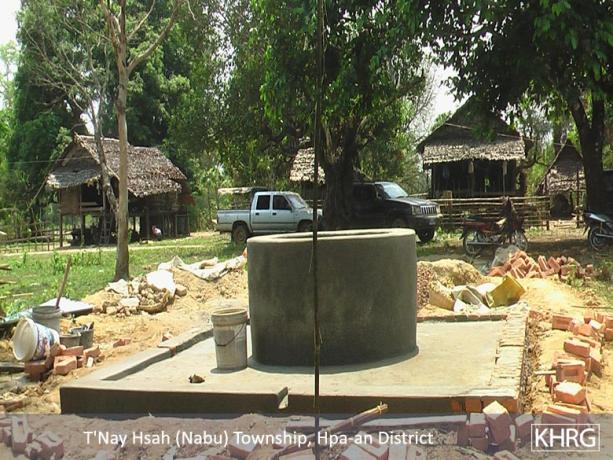
This photo, taken on March 22nd 2012, shows the well under construction. Although the DKBA funded the project by providing all the materials, they forced the villagers from D--- village in T’Nay Hsah Township to build it. Villagers had to transport the necessary materials from Kawkareik town with hand tractors, which is an hour’s journey from the site of the well. [Photo: KHRG]
In the last four months, residents of five village tracts in T'Nay Hsah Township, Pa'an District faced demands for forced labour, including demands to plough and sow paddy crops and construct a water well, and the extortion of arbitrary fees in lieu of forced labour, for damage to crops and for participation in card games, from Tatmadaw, Border Guard and Democratic Karen Buddhist Army (DKBA) troops.
On May 23rd 2012, Tatmadaw Border Guard Battalion #1017 soldiers under the command of Battalion Commander Dih Dih[1] based at Za Ya Phyu Camp, ordered villagers from P--- village, Htee Wah Blaw village tract to hire six porters in lieu of forced labour.[2] The camp is based between R--- and K--- villages. It costs 100,000 kyat (US $122.25)[3] to hire a porter for two months of work, meaning that each household had to contribute 3,000 kyat (US $3.67) in order to raise the 600,000 kyat (US $733.50) demanded in lieu of six porters.
According to a local village head, during April 2012, Tatmadaw soldiers from Light Infantry Battalions (LIBs) #547, #548, and #549 ordered residents of Htee Hpoh Kyaw, Mya P'Deh and Noh Ta Pweh village tracts in T'Nay Hsah Township to bring 12 hand tractors from each village tract in order to plough a paddy field owned by the Tatmadaw.[4] The villagers from Htee Hpoh Kyaw village tract brought 12 hand tractors, the villagers from Mya P'Deh village tract came with nine tractors, while, the villagers from Noh Ta Pweh village tract came with only two hand tractors, making the task of ploughing the paddy field difficult.
Each village tract was ordered to plough ten acres of land, and they were required to work until they had completed the task without fail. Three villagers were required to drive and operate each hand tractor and only three bottles of petrol for each of the hand tractors were provided by the Tatmadaw soldiers per day. The Tatmadaw soldiers did not provide any food for the villagers while the work was being done, so the villagers had to bring their own food every single day until the work was completed.
After ploughing was completed, the Tatmadaw soldiers also ordered villagers to sow paddy. When the seedlings had grown and the paddy plants had become larger, the Tatmadaw herded cattle, which were grazing nearby, into the paddy field, and the cattle ate some of the paddy plants. According to a villager, this was carried out deliberately by Tatmadaw troops in order to extort money from the owners of the livestock, who were subsequently fined 30,000 kyat (US $36.67) per animal to compensate for the damaged crops.
The paddy field in which villagers were ordered to work is located near T'Nay Hsah village, beside the camp where LIB #547 and #548 are based. According to a community member, at one time Muslim villagers and Karen villagers used to live on this site, but about 20 years ago, the Burma government confiscated around 2,000 acres of land from the villagers, and this flat field comprises part of the land that was confiscated.
Older villagers explained that forced labour at this site is part of a predictable pattern of abuse, and that they have been forced to work on this paddy field every year for the past 20 years. One villager, Maung P--- from B--- village, T'Nay Hsah Township, predicted that villagers will again be ordered to harvest the paddy during the harvesting period in November 2012. He explained that villagers will again be forced to bring their own food and sickles for the purpose of harvesting the paddy crop. Maung P--- told the community member working with KHRG that he did not want his voice to be audio-recorded and did not want to be photographed.
According to that community member, villagers from Htee Hpoh Kyaw, Mya P'Deh and Noh Ta Pweh village tracts were likely to face further demands for forced labour following the completion of the ploughing and sowing of the paddy field described above. Villagers were informed that after the ploughing (pictured above) was complete, the villagers would be required to plough another paddy field, this time for the Border Guard.[5] According to that community member, villagers have been forced to plough this field every year since the formation of the DKBA[6] in 1994. The paddy field is located at the base of Noh Hta Baw cliff, close to Noh Hta Baw village. Border Guard Battalion #1015 owns the field and is based in K'Lah Koh camp, under Battalion Commander Mya Hkaing and Battalion Deputy Commander Maung Ngway Heh.
In D--- village, T'Kaw Bee village tract T'Nay Hsah Township, the DKBA donated money for the building of a well in March 2012. However, they did not construct it by themselves, but instead ordered local villagers to work on it from the beginning of the construction process until the well was completed.
Although the DKBA provided all of the materials for the construction of the well, the villagers were required to transport the materials from Kawkareik town by hand tractor, which is an hour's journey from the site of the well.
After the construction of the well was complete, the DKBA held an opening ceremony in celebration, where they gambled with villagers. By charging locals to enter card games, they were able to collect fees and replenish some of the money they had spent on providing materials to build the well.